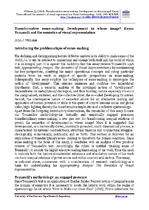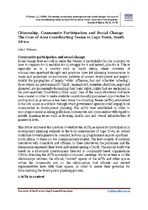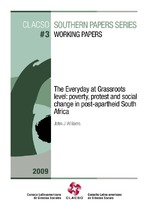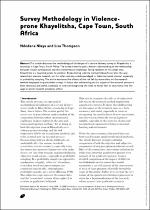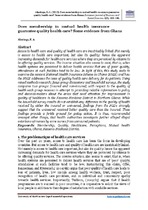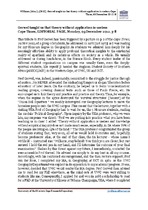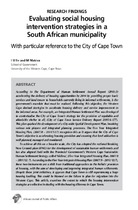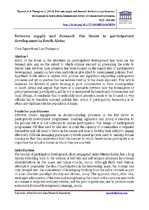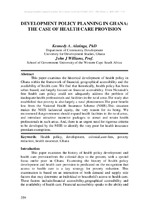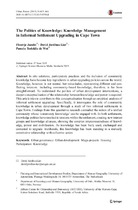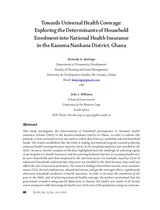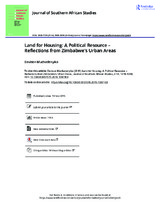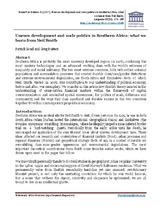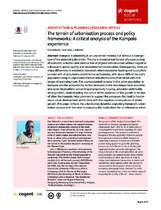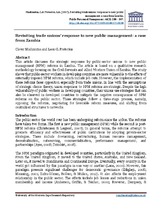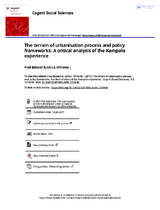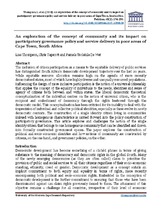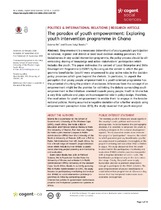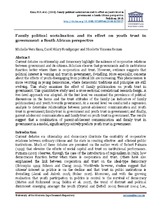Browsing Research Articles (School of Government) by Issue Date
Now showing items 1-20 of 32
-
South Africa: Urban transformation
(Elsevier, 2000)This paper discusses transformation as a multi-dimensional concept to effect social change in South African society in the post-apartheid era. The policy implications of such a variegated understanding of social change ... -
Transformative sensemaking: Development in Whose Image? Keyan Tomaselli and the semiotics of visual representation
(Overseas Publishers Association, 2000)The defining and distinguishing feature of homo sapiens is its ability to make sense of the world, i.e. to use its intellect to understand and change both itself and the world of which it is an integral part. It is against ... -
Citizenship, community participation and social change: The case of area coordinating teams in Cape Town, South Africa
(Wiley, 2004)Social change does not roll in under the wheels of inevitability On the contrary; we have to organize for it, mobilize for it, struggle for it and indeed, plan for it. This is especially so in a country such as South Africa, ... -
The Everyday at Grassroots level: poverty, protest and social change in post-apartheid South Africa
(CLACSO, 2009)This paper posits that social change derives from how the everyday is encountered, analyzed and experienced at the grassroots level. Drawing extensively from the seminal work of Henri Lefebvre, the paper argues that for ... -
Survey methodology in violence-prone Khayelitsha, Cape Town, Couth Africa
(Blackwell Publishing Ltd, 2009)This article discusses the methodological challenges of a service delivery survey in Khayelitsha, atownship in Cape Town, South Africa. The survey aimed to gain a better understanding of the relationshipbetween citizen ... -
Does membership in mutual health insurance guarantee quality health care? Some evidence from Ghana
(EJBSS, 2012)Access to health care and quality of health care are inextricably linked. Not merely is access to health care important, but also its quality: hence the apparent increasing demands for health care services where they are ... -
Gerwel taught us that theory without application is useless
(IOL, 2012)This tribute to Prof Gerwel has been triggered by a picture on p 2 of the Cape Times, 29 Nov 2012, of a group of students, he addressed in 1977 [not 1973] as I was reading for my Honours degree in Geography. As students ... -
Evaluating social housing intervention strategies in a South African municipality
(African Consortium of Public Administration, 2013)According to the Department of Human Settlement Annual Report (2010:5) accelerating the delivery of housing opportunities by 2014 by providing proper basic services and land tenure to households currently living in informal ... -
Between supply and demand: the limits to participatory development in South Africa
(SAGE, 2013)Much of the focus in the literature on participatory development has been on the demand side and on the extent to which citizens succeed in pressuring the state to deliver basic services. Less attention has been focused ... -
Development policy planning in Ghana: The case of health care provision
(European Scientific Institute, 2014)This paper examines the historical development of health policy in Ghana within the framework of financial, geographical accessibility and the availability of health care. Historically, health policy has been urban ... -
The politics of knowledge: Knowledge management in informal settlement upgrading in Cape Town
(Springer, 2015)t In situ solutions, participatory practices and the inclusion of community knowledge have become key ingredients in urban upgrading policies across the world. Knowledge, however, is not neutral, but value-laden, ... -
Towards universal health coverage: Exploring the determinants of household enrolment into National Health Insurance in the Kassena Nankana District, Ghana
(Faculty of Integrated Development Studies, University for Development studies, 2015)This study investigates the determinants of household participation in National Health Insurance Scheme (NHIS) in the Kassena-Nankana District in Ghana. In order to achieve this purpose, a cross-sectional survey was used ... -
Land for housing: A political resource – reflections from Zimbabwe’s urban areas
(Routledge, 2015)When the Zimbabwean government launched the Fast Track Land Reform Programme (FTLRP) in 1999, an international outcry followed, with Zimbabwe described as an international pariah state. Zimbabwe entered a prolonged ... -
Uneven development and scale politics in Southern Africa: what we learn from Neil Smith
(Wiley, 2016)Southern Africa is probably the most unevenly developed region on earth, combining the most modern technologies and an advanced working class with the world’s extremes of inequality and social militancy. The two most extreme ... -
The terrain of urbanisation process and policy frameworks: A critical analysis of the Kampala experience
(Cogent OA, 2017)Kampala is urbanising in an unplanned manner, but without a clear picture of the underlying dynamics. The city is characterised by lack of proper zoning of economic activities and construction of physical infrastructure ... -
Revisiting trade unions’ response to new public management: a case from Zambia
(SAGE Publications, 2017)This article discusses the strategic responses by public-sector unions to new public management (NPM) reforms in Zambia. The article is based on a qualitative research methodology focusing on the Civil Servants and Allied ... -
The terrain of urbanisation process and policy frameworks: A critical analysis of the Kampala experience
(Cogent OA, 2017)Kampala is urbanising in an unplanned manner, but without a clear picture of the underlying dynamics. The city is characterised by lack of proper zoning of economic activities and construction of physical infrastructure ... -
An exploration of the concept of community and its impact on participatory governance policy and service delivery in poor areas of Cape Town, South Africa
(Taylor & Francis, 2018)The inclusion of citizen participation as a means to the equitable delivery of public services has distinguished South Africa’s democratic development trajectory over the last 20 years. While equitable resource allocation ... -
The paradox of youth empowerment: Exploring youth intervention programme in Ghana
(Cogent OA, 2018)Empowerment is a necessary determinant of young people’s participation in national, regional and district or local level decision-making processes. For inclusiveness in any social intervention programme, the policy process ... -
Family political socialisation and its effect on youth trust in government: a South African perspective
(Taylor & Francis, 2018)Current debates on citizenship and democracy highlight the salience of cooperative relations between government and its citizens. Scholars observe that governments and its institutions function better where there is ...


